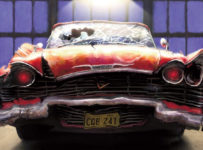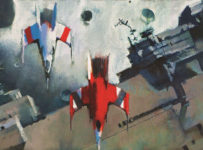The craynarbians drank freely of their caffeel, spliced with slipsharp oil, for Circle's sake …
I'm not normally much of a one to read fantasy or science fiction, with my toes only dipping as deep as Neil Gaiman and Terry Pratchett … special men, and special exceptions. It's not a failing of the genre so much as it's a failing of the self: I find so much of the material I've tried so dry that I haven't been able to immerse myself much further than a few pages. Combine that with the authors' tendencies to prolificacy, which makes it dang near impossible to find a place to start, and then in sequence, and it's something that I generally stay clear of.
Let's ignore entirely SF and fantasy writers' other tendency, after their works get a bit long in the tooth: that of transforming their series into a collection of rape, incest and paedophilic fantasies … which is a wild generalisation, but common enough to note … and let me focus on something good.
The other week, browsing in my favourite "surprise†bookstore (there's no point going there for anything specific, it's a pot luck affair), I saw Stephen Hunt's The Kingdom Beyond The Waves on the shelves. Intrigued by its cover, featuring a steampunk u-boat trailing an ancient diving suit, I meditated on the book and its promise of an archaeology professor seeking the lost civilisation of "Camlantisâ€. I didn't buy it immediately, but rather came back a few days later and purchased it after the allure of a Victorian submarine could no longer be resisted.

The Kingdom Beyond the Waves turned out to be well worth it, but I had some initial misgivings. It soon became clear to me that this was not the first book that Hunt had written in this world. It turned out later that it's a case of world and history sharing, rather than character sharing, but this still poses a problem because if you're unprepared you can drown in terms for races and places and drinks that you've never heard of. Hunt is a good enough writer that soon enough you'll realise that there are apparently a race of four armed crab people operating alongside humanity and … more importantly … "steammen†who subscribe to a voodoo like religion.
Once I'd figured all of this out, the book became one giant ball of "yes†for me. Hunt hits so many of my buttons that it's almost as if he cut into my head and realised so much of the stuff I've always wanted and then overlaid it with things I never knew I was even allowed to want. Look at it like this: it's kind of like Indiana Jones in a fantasy setting with crabs and robots. Mix this in with a traditional Atlantis/Laputa quest, add disgraced royalty reduced to swashbuckling beneath the sea and then season with an eccentric man of high standing who has a thousand false faces and one "true†one, and you have a great book. There are eventually three plot threads running at a time, and every time I reached a new one I'd be cursing because I wanted to know what was going to happen next in the last one. It's a particularly vicious cycle, and one that can only be solved by continuing to read.
What does fantasy have to offer us? Lost technology is one of the greatest lynchpins: people operating machinery and other devices that they simply do not have the wherewithal to produce in their own context: relics of ages long gone. Hunt offers that here with the oil powered car of "Diesela-Khanâ€, not to mention the pure excellence that abides in the steammen and their feral siltempter enemies.
You also have people who "aren't what they seem to be†and who, under Hunt's tutelage, manage to be both exciting and surprising despite their obvious mystery: early in the book a blind man with awesome power manifests his awesome powers. Soon thereafter a blind man with uncanny sonar ability joins the u-boat's crew. Coincidence? Perhaps. Perhaps not!
I should also mention that not only are we treated to steam powered robots, but steam powered robots who have made mortal enemies of thunder lizards. Yes, dinosaurs versus robots. I realise I sound like I'm being flippant here but all of this material works very well together and achieves precisely what it should do: it captured my imagination in a way that forced me to run to the final destination and find out precisely what was going on.
Hunt takes many old ideas, blends them together and creates something that is at once both compelling and familiar. I think that the reason a lot of people stick with genre writing of any sort is because they're given something that is reassuring but hopefully also invigorating, something that reminds them why they follow whatever it is they follow in the first place (for crime, for instance see Ian Rankin's Rebus books). Even now, reading through Terry Pratchett's books again, I'm frequently floored by paragraphs of insight or turns of phrase that resonate deep in my core, and have for the twelve years that I've been reading his work.
The Kingdom Beyond the Waves is the second of what presently stands at three books. I've only just barely touched on what makes the book so good, but I think it's clear that I wholeheartedly recommend it.


